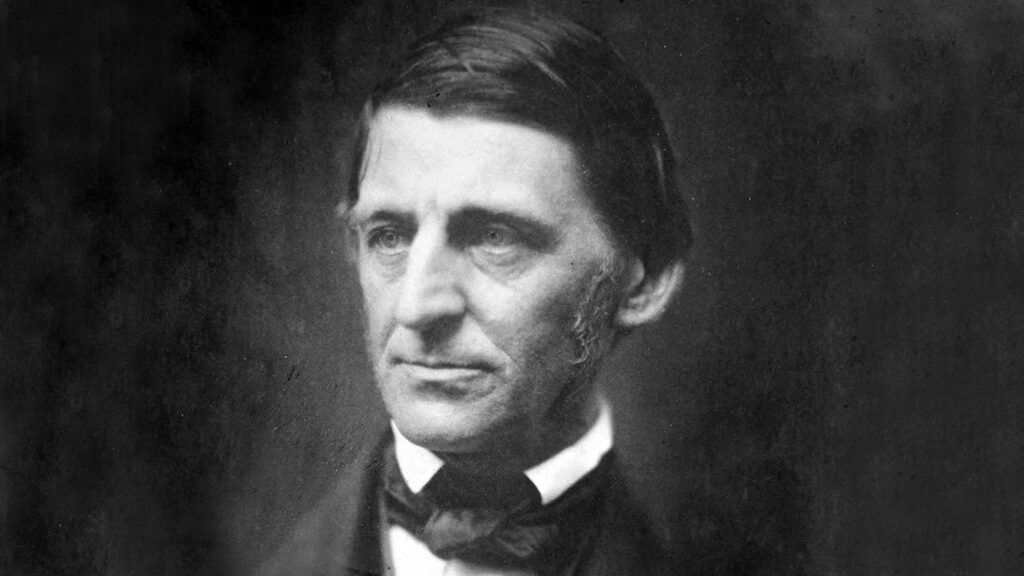Heading to the great outdoors this summer to recharge your batteries? You can thank a transcendentalist for the idea. Turning to nature for spiritual sustenance might seem like an obvious thing to do, but a mere century and a half ago it would have struck most Americans as pretty farfetched (the woods used to be considered a place of danger and darkness).
How about the statement “I’m spiritual, but not necessarily religious”? You’ve probably heard that from a fair number of people. Again, it was the transcendentalists—Ralph Waldo Emerson, Henry David Thoreau, Bronson Alcott, Margaret Fuller and a handful of others—who initially popularized this idea. Even the concept of positive thinking itself had its first champions in this small, short-lived, yet incredibly influential group of New England thinkers.
What exactly were the transcendentalists trying to get at? Start with the word “transcend,” which means to move above and beyond ordinary categories and the limitations that come with them. At heart, that’s what the transcendentalists were going for. Living in a land that was redefining what a nation could be, they saw themselves as seeking a new, and greater, definition of what a human being could be.
None of them worked harder at this task than their most famous and influential member, Ralph Waldo Emerson. America’s original positive thinker, Emerson was a tireless promoter of the basic transcendentalist idea that human beings are larger—infinitely larger—than they think they are. “A man,” he wrote, “is the facade of a temple wherein all wisdom and all good abide.” What we need to do is overcome the self-imposed habits of thought that prevent us from fully realizing this potential. Or as Emerson put it, “The only sin is limitation.”
Shedding old ways of thinking sounds fine on paper. But anyone who’s tried to change, truly change, knows that in practice, it’s a whole other matter. How do we go about doing it? Through his essays, Emerson has given us three keys for unlocking the wisdom and goodness within.
Believe in Yourself
There is in each person, Emerson wrote, a “vast-flowing vigor,” an energy that we can rely upon in any circumstance. Every one of us can tap into this bottomless spiritual reservoir. But we have a tendency to deny it. Have you ever felt overwhelmed by stress and thought, Things never go my way? Beaten yourself up over your mistakes? Deflected a compliment by saying, “Oh, it was nothing”? These are all examples of self-defeating thoughts, also known as stinking thinking.
And that, so often, is what gets in our way. An unwillingness to have faith in our true potential is the single greatest setback to achieving it. “To believe your own thought,” Emerson wrote, “to believe that what is true for you in your private heart is true for all men—that is genius.” Next time you catch yourself slipping into a distorted thinking pattern, stop and do a reality check. Things just aren’t going my way right now. Then act like a genius and give yourself some credit. I might have made some mistakes along the way but what I accomplished is something to be proud of.
Peak Moments
All of us have experienced times when we’re deeply in tune with life and with ourselves, when everything comes naturally. Psychologist Abraham Maslow, father of the human potential movement, called these “peak moments.” More recently, psychology professor Mihaly Csikszentmihalyi has used the term “flow” to describe this state of total engagement. Athletes call it being “in the zone.”
The problem, Emerson realized, isn’t so much how to reach these peaks. It’s how to trust what we learn during them. “Our faith comes in moments,” he wrote. “Our vice is habitual.” The unavoidable humdrum aspects of daily routines dull our memory of how things are when we’re at our best. “So much of our time is preparation, so much is routine, and so much retrospect, that the pith of each man’s genius contracts itself to a very few hours.”
That’s why we need to burn the lessons of those few hours into our minds. We have to hold on to the perspective and clarity we achieve at our peaks and let them sustain us when we’re less inspired. “There is a depth in those brief moments,” Emerson wrote, “which constrains us to ascribe more reality to them than to all other experiences.” The sheer vividness of those highs should make it easier to recall them. That doesn’t mean living in the past. Rather, think of your moments of energy and inspiration as fuel packets. Tap into them whenever you need a boost to move forward.
Positive Is Practical—and Powerful
For Emerson, a positive attitude wasn’t a passive thing, a mere lens for viewing a sometimes difficult world in a kinder light. He believed it held a genuine practical power. Emerson scholar and biographer Robert D. Richardson, Jr., explains this aspect of Emerson’s thought in a wonderfully concrete way.
Consider Emerson’s famous adage: “Hitch your wagon to a star.” Advice that “sounds impractical if beautiful,” Richardson notes. “But it turns out to have an unexpected grounding in the real world. Emerson was thinking…about the tide-mills that used to exist along the East Coast. The incoming tide would turn the wheel one way, the outgoing tide would turn it the other; both ways ground grain and sawed wood, and it was all done by hitching the mill to the tides which are hitched to the moon. So Emerson means his spiritual advice literally.”
Don’t be intimidated by Emerson’s high-sounding language. Take his use of the word “soul.” “The soul is not an organ,” he writes, “but animates all the organs;…is not a faculty, but a light; is not the intellect or the will, but is the master of the intellect and the will.” It is “the background of our being—an immensity that cannot be possessed.” He isn’t talking about some daunting metaphysical abstraction. He’s talking about your true self—the person you are when you’re at your best, your boldest, your most alive and real.
Emerson believed that “the learned and the studious…have no monopoly of wisdom.” Much as he admired scholars, he knew they were often less likely to find their way to an experience of the authentic self than an ordinary person was. “Great is the soul, and plain,” he wrote in that populist spirit that one of his early readers, Walt Whitman, so loved and celebrated. “It is no flatterer, it is no follower…It always believes in itself.” In this and so many other ways, Emerson is the quintessential American philosopher: deep yet democratic, sophisticated yet simple as a glass of cold water on a summer day.
His views didn’t always play well with his contemporaries. He came from a long line of clergymen and started out as one himself. That made the churchmen of his day particularly critical when his thinking diverged from theirs. They found in Emerson’s rhapsodies on the mystic soul the evidence of a troublingly unorthodox sensibility.
Emerson did read deeply in religious writings outside the Judeo-Christian tradition. He studied the Bhagavad-Gita and other Far Eastern spiritual classics decades before it became fashionable. What Emerson’s studies brought him to was a greater understanding that God is in each of us and in the natural world around us—an idea that we almost take for granted today. It explains Emerson’s unflagging faith in the self’s native sufficiency and rightness, his belief that if we find our true spiritual center and act from it consistently, there is nothing we won’t be able to accomplish.
Still, that’s not to say that Emerson saw life as an easy stroll down the street. He was no stranger to hardship. By his early 30s, when he began writing the essays that would make him famous, he had already lost two brothers and buried his wife. He eventually remarried, only to lose his firstborn son at the tender age of five. These tragedies didn’t rob Emerson of his faith in life’s essential goodness, however. They only strengthened it. For him, thinking positively was a way to overcome life’s hurdles, never a means of escape from them.
If you read Emerson’s essays—”Experience” and “The Over-Soul” are excellent ones to start with— you will be amazed to see how many of the insights that fill today’s books and programs on self-improvement originated at his writing desk. From 12-Step programs to this magazine, there isn’t a single contemporary tool for learning how to think positively that wasn’t originally crafted, at least in part, by our greatest American philosopher.
“To finish the moment,” Emerson wrote, “to find the journey’s end in every step of the road, to live the greatest number of good hours, is wisdom.” Emerson and his fellow transcendentalists would be thrilled to know we are seeking—and experiencing—that wisdom for ourselves.
Download your FREE positive thinking ebook!
For more inspiring stories, subscribe to Guideposts magazine.





